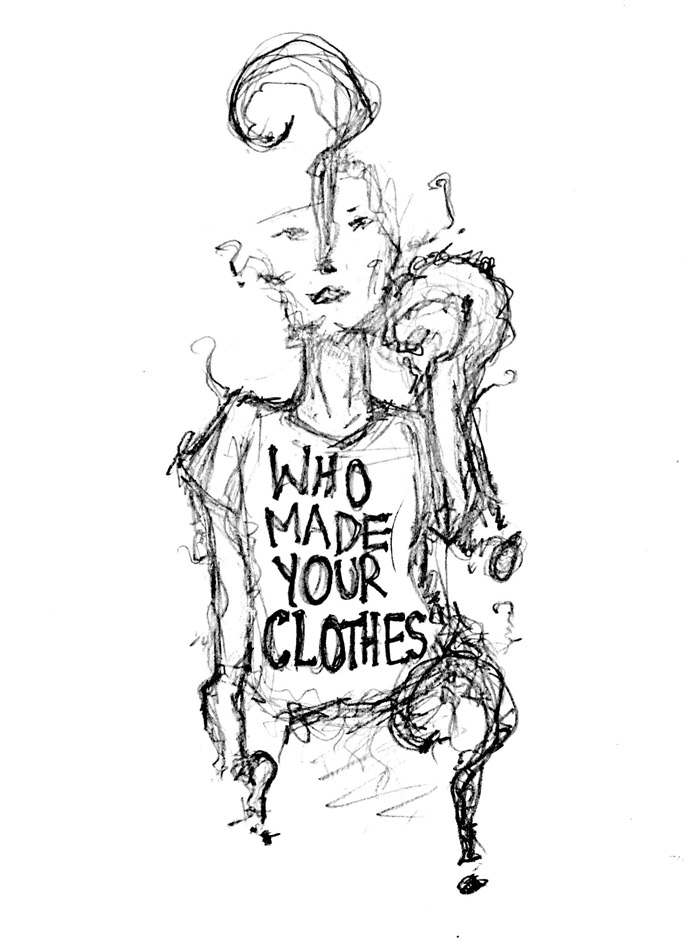Many students know about Nike’s use of sweatshop labour, but when it comes to the brands they love, the desire to buy comfortable, trendy athletic wear tends to trump the desire to shop with a guilt-free conscience. Consumers share a sense of collective denial of their influence on the deeply flawed world of fashion, believing that they, as individuals, cannot change the larger system, and thus changing their shopping behaviour will have little effect.
Teen Vogue reported in July that fast-fashion brands, such as Zara, H&M, and ASOS, sourced materials from factories that were polluting local waterways and emitting noxious gases in their production of viscose, a silk lookalike that is cheaper to produce. The quickly-changing tides of consumer taste in fast fashion have led to an irresponsible consumption culture; trends fade too fast for brands to keep up while sourcing sustainably and employing fair labour practices.
“When most people shop, […] they don’t really reflect on what they buy,” Marine Trouillez, U1 Management and fashion devotee, said. “Fashion changes so quickly that it’s just thrown away.”
To alleviate their contributions to the issue, mass-market labels are quick to jump on what has become a trendy ethical bandwagon. H&M now places garment collection boxes in stores for a ‘take-back’ recycling program and releases a recycled denim collection annually.
Yet, despite the troubling influence of fast fashion, there is promise for change in Montreal’s local-clothing scene. Montreal-native Genevieve Paquette founded Kazak, an ethical clothing and accessory line, after a trip to Mongolia. The project quickly evolved into Les Coureurs de Jupons, a storefront that showcases 110 local designers. Paquette uses material from couch companies that would otherwise be thrown away and produces her designs locally, reducing emissions from transportation. For Paquette, a local focus is key for both the brand’s sustainability and its heart.
“[I] relate to the people in my store and my neighbourhood,” Paquette said. “I know them, and that keeps me […] grounded to the people around me, grounded to my customers.”
This personal connection between designer and customer contrasts the impersonality of global mass-market brands lining Sainte-Catherine street. In Paquette’s eyes, connecting her brand to her customers was crucial to opening up a dialogue. In understanding materials, production, and inspiration, shoppers learn the story behind their clothes.
OÖM is another Montreal-based clothing store that focuses on its environmental footprint; it places a focus on sustainable textiles, such as organic cotton, hemp, recycled polyester, and flax.
Larger brands founded on the principles of sustainability and ethical production have also emerged worldwide. Everlane and Reformation bring simplicity and slickness to a predominantly-online consumer base while providing the total cost of production and environmental impact—including pounds of waste, gallons of water, and CO2 emission levels—of every item on sale.
The cost of purchasing new ethically-sourced and fair-trade clothes can stretch a student’s budget. But it’s still possible to subvert the fast-fashion buying cycle; Montreal is home to several stores that are kind to students’ wallets and consciences. Perusing the city’s many thrift shops is one way to add high-quality used pieces to a wardrobe while staying budget-conscious. Another option is simply cutting down on consumption and assembling a workable capsule wardrobe of a small number of versatile essentials to mix and match for any situation.
“Since I became more aware of fast fashion [and its downsides], I’ve definitely shopped less,” Chelsea Jang, U0 Arts, said. “When I do buy something, 99 per cent of the time it’s something I love wearing and […] am proud to wear.”
Interrupting the vicious cycle of cheap production and high turnover can change consumers’ mindsets around clothes as well. Students have the power to combat the idea that clothing is disposable; whether that means capping consumption, recycling used pieces, or supporting more responsible brands, valuing where clothes come from will go a long way.









